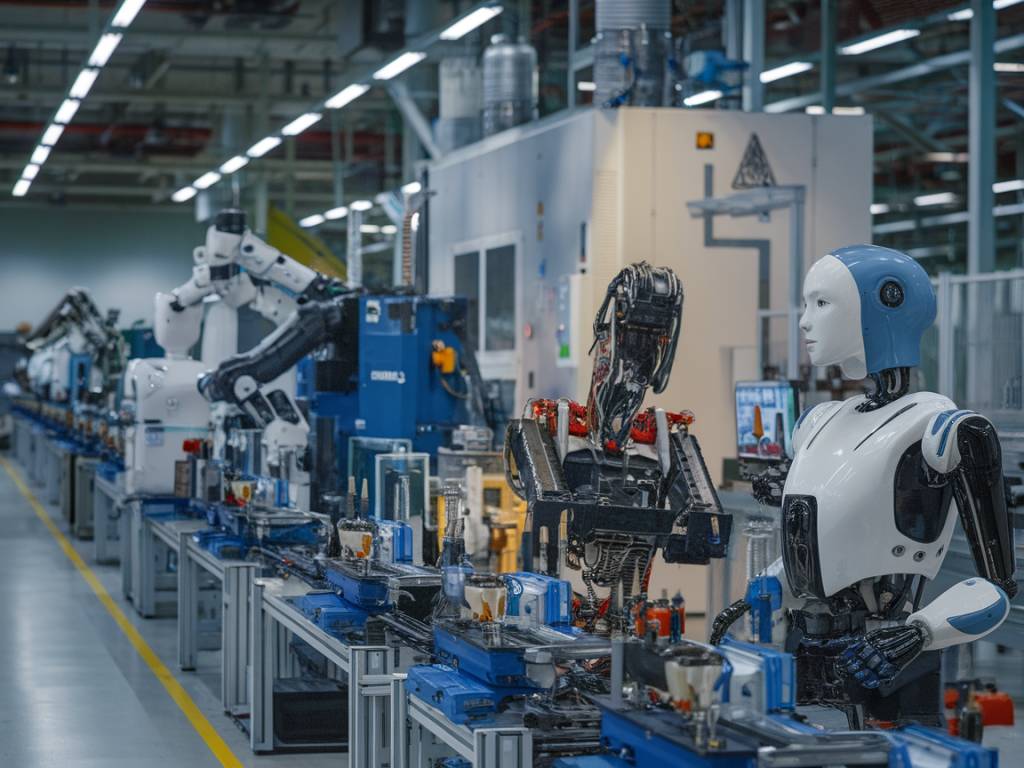The Rise of Automation: Transforming the Job Market in the Age of AI
Automation is no longer a futuristic concept—it is a reality reshaping industries at an unprecedented pace. Artificial Intelligence (AI) and machine learning are driving this transformation, redefining the job market and forcing both businesses and employees to adapt. But is automation truly a threat to employment, or does it present new opportunities for growth?
Automation and Job Displacement: A Growing Concern
The fear of job loss due to automation is not unfounded. Many sectors have already seen a reduction in human labor as AI-powered systems take over tasks previously performed by workers. Manufacturing, logistics, and customer service are among the industries most affected.
For instance, in the automotive industry, robotic assembly lines have replaced a significant portion of manual labor, increasing efficiency while reducing employment in traditional roles. Similarly, self-checkout kiosks and AI-driven chatbots are minimizing the need for cashiers and customer service representatives—a trend that is accelerating with advancements in natural language processing.
According to a report by the World Economic Forum, automation could displace around 85 million jobs by 2025. Yet, while some roles are disappearing, others are emerging to take their place.
New Jobs and Opportunities in the AI Era
History has demonstrated that technological advancements do not necessarily eliminate jobs—they often create new ones. The Industrial Revolution, for example, led to mass job displacement in agriculture but paved the way for employment in manufacturing and services. The same pattern is unfolding today.
AI and automation are generating demand for a range of new professions, including:
- Data Analysts and AI Specialists
- Cybersecurity Experts
- Automation Engineers
- Digital Marketing Strategists
- AI Ethics Consultants
These roles require new skills, emphasizing the need for continuous learning and workforce adaptation. While lower-skilled positions may be at risk, opportunities abound for those who can upskill and transition into emerging fields.
Industries Most Affected by Automation
Not all sectors are impacted equally by automation. Some industries are more susceptible to AI-driven transformation than others. Among the most affected are:
- Manufacturing: Robotics and automation have significantly reduced the need for human workers on production lines.
- Retail: Self-service checkouts, robotic inventory management, and automated warehouses are reshaping the industry.
- Finance: AI-powered trading algorithms and robo-advisors are streamlining investment strategies and reducing reliance on human analysts.
- Healthcare: While automation in healthcare is enhancing efficiency, particularly in diagnostics and administration, it is unlikely to completely replace human professionals.
- Transportation: Autonomous vehicles and drones are set to challenge traditional logistics and delivery jobs.
However, industries focused on creativity, human interaction, and critical thinking—such as education, mental health, and complex problem-solving—remain relatively resistant to automation.
The Role of Governments and Businesses
As automation accelerates, policymakers and business leaders must take proactive steps to mitigate negative impacts. Governments play a crucial role in providing training programs and incentives for workforce adaptation. Initiatives such as reskilling programs, tax incentives for hiring displaced workers, and revamped education curricula can help ease the transition.
Businesses, too, have a responsibility to support employees in their adaptation efforts. Companies investing in employee training and requalification will likely see long-term gains in productivity and workforce loyalty.
How Can Workers Adapt?
For employees, the key to navigating this shift lies in continuous learning. Professions that emphasize soft skills—such as critical thinking, emotional intelligence, and creativity—will remain invaluable even in an AI-driven world. Technical skills, particularly in data analysis, coding, and automation, will become increasingly relevant.
Here are some steps workers can take to future-proof their careers:
- Enroll in online courses to gain knowledge in AI, coding, and automation.
- Develop soft skills, including communication and leadership abilities.
- Stay informed about industry trends and evolving job market demands.
- Seek certifications that enhance employability and career progression.
- Embrace a mindset of adaptability and willingness to change industries if necessary.
Final Thoughts
While automation and AI-driven technologies undoubtedly disrupt traditional industries, they also open doors to new opportunities. Rather than viewing automation as a threat, businesses, governments, and individuals must acknowledge it as an inevitable progression—and prepare accordingly.
The future of work is dynamic. Those who adapt to technological advancements with a proactive mindset stand to benefit the most. The challenge ahead is not about resisting automation, but about harnessing it for sustainable economic progress and widespread professional growth.
